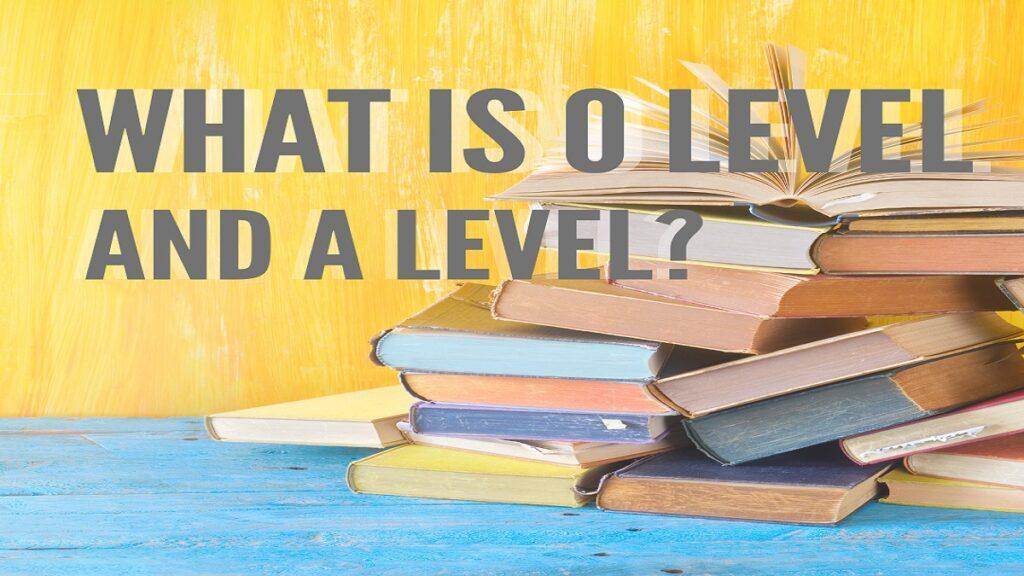A-Level education is significantly more difficult than O-levels. A-Levels are advanced level courses designed to prepare students for university study, while O-levels are ordinary level courses designed to prepare students for a variety of career paths. A-Level courses cover more complex material, have higher expectations, and require more coursework and exams than O-level courses. However, A-Levels are also a more rewarding qualification, with students who achieve good grades more likely to be accepted into top universities and secure high-paying jobs after graduation.
Understanding the Difference between O-Levels and A-Levels
When it comes to understanding the difference between O-Levels and A-Levels, it’s important to consider a few key factors. O-Level Education, also known as Ordinary Level Education, is typically taken during the lower secondary level, while A-Level Education, also known as Advanced Level Education, is pursued during the higher secondary level.
One significant distinction between O-Levels and A-Levels is the level of complexity in the curriculum. A-Level subjects tend to be more challenging, requiring a deeper understanding and application of knowledge. This is why many students seek A-Level tutors to help them navigate the complexities of their subjects and excel in their studies.
Another difference lies in the transition from O-Levels to A-Levels. Moving from one level to the next can be a daunting process, as A-Levels require a greater level of independence and self-directed learning. O-Level students often rely on structured learning environments and guidance from their teachers, while A-Level students must take on more responsibility for their own education.
Additionally, A-Levels emphasize the development of critical thinking and analytical skills. These abilities are essential for success in college and beyond. A-Levels provide students with the opportunity to explore complex ideas, engage in independent research, and develop a deeper understanding of their chosen subjects.
Lastly, A-Level Education allows for more specialization and tailoring of education to personal interests. Students can choose from a wide range of subjects and focus on those that align with their career aspirations or academic passions. This flexibility allows for a more personalized learning experience and can lead to greater engagement and motivation.

Curriculum Complexity in A-Levels
When it comes to curriculum complexity, A-Level Education takes the crown. A-Levels subjects delve deeper into the material and require a higher level of understanding and application of knowledge. Students who have successfully completed O-Levels may find the transition to A-Levels challenging, as the curriculum complexity increases significantly. This is where A-Level tutors come into the picture.
A-Level tutors provide invaluable support to students by helping them navigate through the complexities of their subjects. These tutors have a deeper understanding of the curriculum and can provide personalized guidance and assistance. They help students develop critical thinking skills, master complex concepts, and excel in their studies.
The curriculum complexity in A-Levels prepares students for higher education and beyond. By delving deeper into subjects, A-Levels encourage students to think critically and analytically. This not only enhances their understanding but also equips them with the skills needed to succeed in higher education and the workforce.
The presence of A-Level tutors adds another layer of support to students. With their guidance, students can navigate through the intricacies of the curriculum and confidently tackle challenging topics. The personalized attention from A-Level tutors ensures that students are able to grasp complex concepts, leading to better academic performance.
Overall, the curriculum complexity in A-Levels sets it apart from O-Levels. A-Levels demand a higher level of understanding, application, and critical thinking, making it a more challenging and rewarding educational experience. With the help of A-Level tutors, students can conquer these challenges and excel in their academic journey.
Transitioning from O-Levels to A-Levels
Transitioning from O-Levels to A-Levels can be a significant milestone in a student’s academic journey. It marks the shift from lower secondary to higher secondary education, and with it comes a new set of challenges and responsibilities. This transition can be both exciting and daunting at the same time.
Moving from O-Levels to A-Levels means stepping into a more independent and self-directed learning environment. While O-Level students often rely on structured learning environments and guidance from their teachers, A-Level students must take on more responsibility for their own education. This means managing their time effectively, setting goals, and staying motivated even when faced with complex subjects.
Another aspect of transitioning to A-Levels is the increased level of complexity in the curriculum. A-Level subjects delve deeper into the material, requiring a higher level of understanding and application of knowledge. This can be overwhelming for students who have just completed their O-Levels. However, it also presents an opportunity for growth and development. A-Level education pushes students to think critically, analyze information, and engage in independent research. It prepares them for higher education and beyond, where these skills are highly valued.
To ease the transition from O-Levels to A-Levels, students can seek support from their teachers, peers, and even from o-a-Level tutors. These tutors can provide personalized guidance and assistance, helping students navigate through the intricacies of their subjects. They can help clarify concepts, provide additional resources, and offer strategies for effective studying. By availing themselves of these resources, students can make a smoother transition and set themselves up for success in their A-Level studies.
Overall, transitioning from O-Levels to A-Levels is a significant step in a student’s educational journey. It requires a greater level of independence and self-directed learning, as well as the ability to tackle more complex subjects. However, with the right support and mindset, students can successfully navigate this transition and thrive in their A-Level education.
Developing Critical Thinking and Analytical Skills
Developing critical thinking and analytical skills is a key aspect of A-Level Education. A-Level subjects go beyond rote memorization and require students to think critically, analyze information, and draw informed conclusions. This emphasis on critical thinking prepares students for higher education and beyond, where these skills are highly valued.
Through A-Level Education, students are challenged to question assumptions, evaluate evidence, and develop logical arguments. They learn to analyze complex ideas and draw connections between different concepts. This process of critical thinking allows students to develop a deeper understanding of their chosen subjects and encourages them to engage with the material on a deeper level.
In addition to critical thinking, A-Level Education also focuses on developing analytical skills. Students are taught to analyze data, interpret graphs and charts, and draw meaningful conclusions. They learn how to analyze and evaluate different perspectives, strengthening their ability to think analytically and make well-informed decisions.
The development of critical thinking and analytical skills in A-Levels goes beyond the classroom. These skills are transferable to various areas of life, including problem-solving, decision-making, and effective communication. They provide students with the tools they need to succeed not only in higher education but also in the workforce and in everyday life.
Depth of Understanding in A-Levels
A-Level Education is known for its emphasis on depth of understanding. Unlike O-levels, which often focus on covering a broad range of topics, A-levels allow students to delve deeper into their chosen subjects. This depth of understanding is what sets A-Levels apart and makes them more challenging.
In A-level subjects, students are encouraged to explore complex ideas, analyze different perspectives, and draw connections between various concepts. They are challenged to think critically and develop a deeper understanding of the material. This requires not just memorizing facts, but truly grasping the underlying principles and theories.
The depth of understanding in A-Levels extends beyond the classroom. Students are expected to engage in independent research, seek out additional resources, and think critically about the information they encounter. This level of intellectual curiosity and exploration helps prepare students for higher education, where independent thinking and research skills are highly valued.
By promoting depth of understanding, A-level education fosters a love for learning and a passion for knowledge. It encourages students to go beyond the surface-level understanding and truly engage with their subjects. This depth of understanding not only prepares students for further academic pursuits but also equips them with the skills and mindset needed to succeed in the rapidly changing and complex world we live in.
Tailoring Education to Personal Interests
One of the major advantages of A-Level Education is the ability to tailor your education to your personal interests. Unlike O-Levels, which often have a set curriculum, A-Levels offer a wide range of subjects for students to choose from. This flexibility allows students to pursue their passions and delve deeper into the subjects they are most interested in.
By choosing subjects that align with their career aspirations or academic interests, students can make their education more meaningful and engaging. Whether it’s pursuing science, arts, humanities, or any other field, A-Levels provide the opportunity to specialize and focus on the areas that truly captivate them.
Tailoring education to personal interests also has numerous benefits beyond the classroom. When students are passionate about the subjects they study, they are more likely to be motivated, engaged, and invested in their learning. This can lead to higher levels of academic achievement and overall satisfaction with their educational journey.
Moreover, choosing subjects based on personal interests can also pave the way for future career opportunities. A-Levels provide students with a strong foundation in their chosen fields, making them well-prepared for higher education and professional pathways.
A-Level Education and Higher Education Pathways
A-Level Education not only prepares students for higher education but also opens up various pathways for their future academic and professional careers. A-Levels provide a strong foundation in specific subjects, making students well-equipped to pursue higher education in their chosen fields.
One of the major advantages of A-Levels is the ability to specialize and tailor education to personal interests. This allows students to focus on the subjects that truly captivate them and align with their career aspirations. By choosing subjects based on personal interests, students can set themselves up for success in higher education and beyond.
Additionally, a-levels give students the information and abilities they need to succeed in their chosen industries. The emphasis on critical thinking, analytical skills, and depth of understanding prepares students for the rigors of higher education. Whether it’s pursuing a degree in the sciences, humanities, arts, or any other field, A-Levels provide a solid foundation for further academic pursuits.
Furthermore, A-Level qualifications are highly regarded by universities and colleges around the world. These qualifications are often seen as a benchmark of academic excellence and can greatly enhance students’ chances of admission into top-tier institutions. A-Level students are often given credit for their prior knowledge and may even be eligible for advanced placement or exemptions in certain courses.
Conclusion: Comparing the Difficulty of A-Levels and O-Levels
After exploring the differences between O-Levels and A-Levels, it is clear that A-Levels are indeed more challenging than O-Levels. A-Levels demand a higher level of complexity in the curriculum, emphasizing critical thinking, analytical skills, and depth of understanding. The transition from O-Levels to A-Levels can be daunting, as students must adapt to a more independent and self-directed learning environment. However, this transition also presents an opportunity for growth and development.
A-Level Education goes beyond rote memorization and encourages students to think critically, analyze information, and draw informed conclusions. By delving deeper into their chosen subjects, students develop a deeper understanding and engage with the material on a more profound level. This depth of understanding prepares students for higher education and beyond, where independent thinking and research skills are highly valued.
Another advantage of A-Levels is the ability to tailor education to personal interests. This flexibility allows students to pursue their passions and engage more meaningfully with their studies. By choosing subjects aligned with their career aspirations or academic interests, students can set themselves up for success in higher education and future professional pathways.
In conclusion, while O-Levels serve as an important foundation, A-Levels provide a more challenging and rewarding educational experience. A-Levels push students to think critically, develop analytical skills, and explore complex ideas. They foster a love for learning, equip students with essential skills, and open up various pathways for future academic and professional success.











